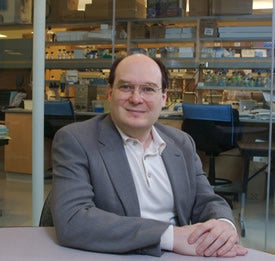A Message from Department Chair Jonathan Karn, PhD
The Department of Molecular Biology and Microbiology provides a focus within the School of Medicine for the study of the growth and development of microorganisms at the molecular level. Many of the research programs in the department concern fundamental mechanisms using the tools of molecular biology: How is gene expression controlled? What is the role of RNA processing and surveillance in gene expression? How do surface molecules regulate molecular signaling events? Other questions under investigation are specific to microorganisms: How do bacteria and viruses survive in their chosen environment? How do they deal with the host's potent immune response? What genes are responsible for their pathogenesis? How is the latency and reactivation of infection achieved? How can we use our results to improve prevention, diagnosis, and treatment of infectious diseases?
We study microbial systems both for the insights that they bring to the study of molecular and cellular biology and to improve our understanding of infectious diseases. Viruses provide exquisitely adapted probes of the host cell's normal functions. Historically, studies of viruses have provided numerous insights into the control of gene expression at the transcriptional, post-transcriptional, and translational levels. Fundamental processes such as repression of gene expression, splicing, reverse transcription, capping of messenger RNA, internal initiation of protein synthesis, processing of membrane proteins through the Golgi apparatus, and the identification of oncogenes, were all initially uncovered through studies of viruses.
The medical challenges posed by viruses and microbial pathogens remains enormous. Despite the availability of potent antimicrobial drugs, microbial pathogenesis gives rise to severe complications including blindness, paralysis, and neurological defects and can lead to chronic diseases including cancer, heart, lung or kidney disease. Recently, the challenges posed by the infectious disease have been exacerbated by the emergence not only of new pathogens, such as the SARS, AIDS and West Nile viruses, but also by generations of new bacterial and viral strains that display increased resistance to antimicrobial drugs. It is only by developing a thorough understanding of the biology of pathogenic microbes, their host organisms, and how the two interact during infection that improved strategies for prevention and treatment of infectious diseases can be achieved.
Our distinguished faculty have successful nationally-funded research programs and publish in the most prestigious journals. Many serve on study sections for the NIH, serve as editors of journals and take leadership positions throughout the Medical School. We also enjoy numerous collaborations with faculty in the departments of Biochemistry, Neuroscience and Genetics, the Case Comprehensive Cancer Center, the Center for AIDS Research, and the Center for RNA Molecular Biology. All these activities create a vibrant scientific environment.
There is a tremendous synergy among our faculty as we initiate new programs in microbial pathogenesis and virology that utilize genetic and molecular analysis of microorganisms. A common technical theme running throughout the department is the use of fluorescent microscopy to image molecules within cells. Applications range from the localization of viral proteins within eukaryotic cells to polar structures with bacterial cells. Another important theme that defines our work is the use of genetic tools to rigorously study the molecular biology of microorganisms. With the completion of the genome sequence for a vast array of organisms, including man, the availability of transgenic animals with specific immunological defects, and advances in bacterial and viral genetics, we are in a unique position to understand the genetic basis for bacterial and viral pathogenesis. The development of multidisciplinary programs that provide for productive interactions with our clinical colleagues studying infectious diseases and exploit genetics, microbiology, and modern biochemistry, including structural biology in the study of micro-organisms, will be the key to our long-term success.
Traditionally, the department has had outstanding postdoctoral and graduate student training programs. Most of our trainees have become faculty at prestigious universities here and abroad, while others have become notable scientific leaders in the biotechnology and pharmaceutical industries.
We currently offer three different PhD degrees: our traditional program in Molecular Biology and Microbiology, our program in Cell Biology, and our unique program in Molecular Virology, a multi-departmental program drawing on faculty from many departments at Case Western Reserve University and the Cleveland Clinic Foundation.
We look forward to the continuing scientific excellence in the coming years!
Jonathan Karn, PhD


